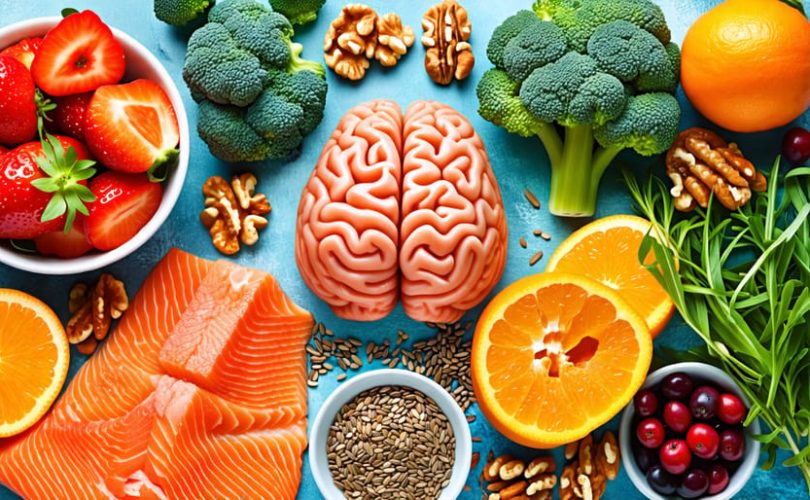Improve your child’s mental health by incorporating more omega-3-rich foods such as fish, flaxseeds, and walnuts. These nutrients are essential for brain health and emotional regulation. Reduce processed sugar intake, which can cause mood swings and irritation, by replacing sugary snacks with fruit, yogurt, or nuts. Ensure daily meals are well-balanced with whole grains, lean proteins, and colorful vegetables to stabilize energy and promote well-being. Encourage hydration by providing access to water and limiting sugary drinks, as dehydration can negatively affect mood and concentration. For a comprehensive approach to enhancing your child’s diet and mental wellness, refer to this diet guide for more insights and practical tips.
Understanding Diet and Mental Health: An Overview
The Brain-Gut Connection
The brain and gut are intricately connected, forming what scientists call the “gut-brain axis.” This link means that the health of our digestive system can have a significant impact on our mental well-being. A major player in this connection is the gut flora—trillions of microorganisms living in the digestive tract. These microbes are not just passive residents; they actively produce neurotransmitters like serotonin, which plays a crucial role in regulating mood. In fact, about 90% of the body’s serotonin is produced in the gut. When the balance of gut bacteria is disrupted, it can affect this production, potentially leading to mood disorders.
For concerned parents, teachers, and healthcare professionals, understanding this connection emphasizes the importance of a healthy diet in caring for a child’s mental health. Supporting gut health with a diet rich in fiber, probiotics, and diverse nutrients can help maintain a balanced microbiome. This, in turn, may support mental clarity and emotional stability in children, offering a compassionate approach to enhancing their overall well-being.

Nutrients and Their Role in Mental Well-being
Omega-3 fatty acids, vitamins, and minerals play a crucial role in nurturing mental well-being, especially in children. Omega-3s, commonly found in fish like salmon and flaxseed, support brain health by fostering better communication between brain cells. This can help improve mood and reduce anxiety. Essential vitamins, such as B-vitamins, enhance energy levels and brain function. You can find them in foods like whole grains, leafy greens, and eggs. Meanwhile, Vitamin D, sometimes called the “sunshine vitamin,” has been linked to reduced risk of depression. Encourage kids to spend time outdoors and enjoy foods like fortified dairy products for a natural boost. Minerals such as magnesium and zinc also play a part in mental health by supporting neurotransmitter regulation. Including nuts, seeds, and legumes in a child’s diet can help maintain these beneficial minerals. Tailoring meals that incorporate these nutrients can create a supportive foundation for your child’s mental and emotional development.
Dietary Patterns and Their Emotional Effects
Processed Foods and Mental Health Risks
The colorful packaging and convenience of processed foods often make them a go-to choice for busy families. However, excessive consumption of these foods, laden with sugars and unhealthy fats, may impact children’s mental well-being. Research indicates that a diet high in processed foods may be linked to increased risks of anxiety and depression in children, affecting their emotional health.
It’s essential for caregivers to be aware of these potential effects and consider how dietary habits can influence a child’s mood. Too much sugar can cause energy spikes and crashes, creating mood swings and irritability. Encouraging your children to develop a healthy relationship with food can help mitigate these risks. Introducing more whole foods, such as fruits, vegetables, and whole grains, can provide the nutrients necessary for stable mental health.
Experts recommend gradually replacing processed snacks with healthier alternatives. For example, preparing homemade meals or involving children in the cooking process can make healthy eating more appealing. While making these changes can seem daunting, small, steady steps can nurture a positive mindset and support lasting mental health improvements.
Benefits of a Balanced Diet
Maintaining a balanced diet rich in fruits, vegetables, and whole grains offers significant mental health benefits for children. When kids consume nutrient-dense foods, they receive essential vitamins and minerals that support brain function and emotional well-being. For instance, omega-3 fatty acids found in certain fruits and vegetables play a critical role in cognitive development and can enhance mood stability. Furthermore, a diet comprising whole grains helps with steady energy release, which is crucial for maintaining focus and preventing mood swings throughout the day.
It’s fascinating to see how something as simple as choosing the right foods can impact a child’s mental health. Experts emphasize that eating a variety of colorful fruits and leafy greens not only fuels growing bodies but also nurtures developing minds by reducing symptoms of anxiety and depression. Alongside nutritious foods, incorporating adequate drinking water is essential to keep children mentally sharp and hydrated.
Parents and teachers play an essential role in guiding children towards making healthier food choices, fostering not just physical but mental resilience. Providing a supportive environment where kids can learn about and enjoy balanced meals sets a foundation for lifelong mental wellness.

Practical Tips for Parents and Caregivers
Creating a Nutrient-Rich Meal Plan
Creating a nutrient-rich meal plan that supports mental health begins with understanding the importance of balanced nutrition. Foods rich in essential vitamins and minerals can greatly influence a child’s mood, behavior, and cognitive functions. For a start, ensuring a colorful plate filled with fruits, vegetables, whole grains, lean proteins, and healthy fats like those found in fish and avocados is crucial. Omega-3 fatty acids, for example, play a vital role in brain health and can be introduced through foods such as salmon or walnuts.
Incorporating personal stories of families who’ve noticed positive changes in their children’s mental well-being after dietary adjustments can provide motivation. Expert opinions also reinforce the idea that what children eat can affect how they feel and behave. Ensuring children have regular meals and snacks helps maintain stable blood sugar levels, reducing mood swings.
To inspire lifelong healthy eating, involve children in meal planning and cooking. This not only teaches them valuable skills but also encourages them to try new foods. Remember, the goal is not perfection but progress towards a more balanced and supportive diet.

Engaging Children in Healthy Eating
Encouraging children to develop healthy eating habits can be an engaging and positive experience. Start by involving them in meal planning and grocery shopping; this empowers them to make choices and learn about different foods. Cooking together is another wonderful way to pique interest. Let them wash vegetables or stir batter, turning cooking into a fun, hands-on activity. Share stories from your family or community where healthy eating made a difference; kids respond well to relatable narratives. Even small tasks like setting the table or picking herbs for a recipe can boost their involvement and excitement about meals. Speaking with nutritionists or teachers to understand how diet impacts mood can also be beneficial. Remember, the goal is to create a balanced approach without pressure, making fruits, vegetables, and whole grains a natural choice rather than a chore. Small, consistent steps can nurture a lifelong appreciation for nutritious foods, supporting both physical and mental wellbeing.
Expert Opinions and Stories
Dr. Emily Sanders, a child psychologist with over 15 years of experience, emphasizes the powerful link between nutrition and mental health in children. She suggests that everyday dietary choices can significantly impact behaviors and emotions. “It’s essential to understand that what a child eats fuels not just their body, but also their mind,” Dr. Sanders explains. Many nutrients, like omega-3 fatty acids and certain vitamins, are crucial for brain development and mood regulation. Dr. Sanders encourages parents and caregivers to consider these nutrients when planning meals.
On that note, several families have shared their transformative experiences after making mindful dietary changes. The Martins, a family from Ohio, noticed a remarkable improvement in their son’s attention span and mood after reducing processed sugars and incorporating more whole foods. “His teachers have commented on how much more focused he is in class,” Mrs. Martin shared, beaming.
Another compelling story comes from the Gonzalez family. After consulting a nutritionist, they altered their daughter’s diet to include more leafy greens and lean proteins. The change was gradual, but they witnessed a significant reduction in her anxiety levels. “It’s like we have a new child,” Mr. Gonzalez says, explaining the positive shift in family dynamics and his daughter’s newfound confidence.
These stories, coupled with expert insights, highlight the potential benefits of dietary modifications. While each child is unique, experimenting with nutritional changes might offer a pathway to enhanced mental well-being, fostering an environment where children can thrive emotionally and academically.
Conclusion: Empowering Parents through Nutrition
Understanding the critical connection between nutrition and mental health can empower parents to make informed choices that support their children’s overall well-being. Good nutrition doesn’t just fuel the body; it nurtures the mind, helping young ones feel more focused, balanced, and resilient. By incorporating a variety of whole foods like fruits, vegetables, and whole grains into daily meals, parents can create a nourishing environment that promotes positive mental health. Encouraging these habits early lays a foundation for lifelong healthy choices. Engaging children in grocery shopping and meal preparations can also be a fun way to teach them about the benefits of different foods. Remember, it’s about balance rather than perfection. Small, consistent changes can make a significant impact. By staying informed and proactive, parents can truly play a pivotal role in supporting their children’s mental health through thoughtful dietary practices.







